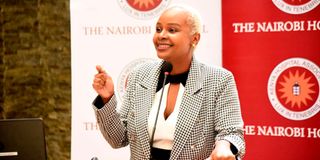Breaking News: Old Kijabe dam tragedy: Death toll rises to 45
Show me your universal health coverage plan

Chief Administrative Secretary the Ministry of Health, Dr Mercy Mwangangi, during a breakfast roundtable for women leaders in Kenya’s health sector on March 30, 2022.
What you need to know:
- Kenya donated Sh519 million to the continental UHC and has had progress in priority areas like skilled birth attendance, maternal health and child health.
- Healthcare demand has increased with the epidemiological transition from communicable diseases to the triple burden of disease.
A sound healthcare system is essential for long-term economic stability and vitality; universal health coverage (UHC) is the byword for it. It’s consubstantial with a global system that protects households from financial risks and provides access to the highest possible standard of health on the basis of equity and solidarity.
Having codified the human right to health in the Constitution, articulated it in Kenya Vision 2030 and even adopted the 2030 AU health pledge, Kenya donated Sh519 million to the continental UHC and has had progress in priority areas like skilled birth attendance, maternal health and child health.
But healthcare demand has increased with the epidemiological transition from communicable diseases to the triple burden of disease. Emerging non-communicable diseases (NCDs) and injuries outstrip supply amid equity concerns, a disregard for basic sectoral issues and fragmented or misguided policy initiatives.
There were 26.3 registered medical officers per 100,000 people as of 2020. While this is an increase from 2019, more than 100,000 workers are still required to satisfy the WHO-recommended 23 health professionals for every 10,000 people, and only 12,792 registered medical doctors.
Lopsided services
The few health staff are unevenly distributed. A 2016 survey shows nurses per 10,000 people at 9.7 per 10,000 in Nairobi and 100,000 to 10,000 in the north. Doctors ranged from 9.5 per 10,000 people in Nairobi to 0.8 in Mandera.
Staff shortages apart, non-appreciation of health workers and alienation of cadres other than physicians, nurses and midwives makes for lopsided services and quality. Add to this corruption in the sector.
Reports intimate that most physicians use needless treatments to defraud patients and 20.6 per cent of medical care is unnecessary, including prescriptions, tests and surgeries. That is three per cent of healthcare spending, causing patients big losses.
These challenges should be addressed as a matter of priority by politicians seeking the presidency.
Mr Onyango, a life scientist, is a Global Fellow at Moving Worlds Institute. [email protected]





